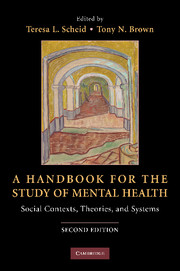Book contents
- A Handbook for the Study of Mental Health Second Edition
- A Handbook for the Study of Mental Health Second Edition
- Copyright page
- Dedication
- Contents
- Contributors
- Foreword
- Preface
- Part I Approaches to Mental Health and Illness: Conflicting Definitions and Emphases
- Part II The Social Context of Mental Health and Illness
- 9 Stressors, Stress, and Distress
- 10 Social Support and Mental Health
- 11 Work and Unemployment as Stressors
- 12 Socioeconomic Stratification and Mental Disorder
- 13 Gender and Mental Health: Do Men and Women Have Different Amounts or Types of Problems?
- 14 Race and Mental Health: Patterns and Challenges
- 15 African American Women and Mental Well-Being: The Triangulation of Race, Gender, and Socioeconomic Status
- 16 Marital Status and Mental Health
- 17 Stress and Distress in Childhood and Adolescence
- 18 Psychopathology and Risky Sexual Behaviors among Black Adolescents
- 19 Well-Being across the Life Course
- 20 Mental Health and Terrorism
- Part III Mental Health Systems and Policy
- References
- Index
9 - Stressors, Stress, and Distress
from Part II - The Social Context of Mental Health and Illness
Published online by Cambridge University Press: 05 June 2012
- A Handbook for the Study of Mental Health Second Edition
- A Handbook for the Study of Mental Health Second Edition
- Copyright page
- Dedication
- Contents
- Contributors
- Foreword
- Preface
- Part I Approaches to Mental Health and Illness: Conflicting Definitions and Emphases
- Part II The Social Context of Mental Health and Illness
- 9 Stressors, Stress, and Distress
- 10 Social Support and Mental Health
- 11 Work and Unemployment as Stressors
- 12 Socioeconomic Stratification and Mental Disorder
- 13 Gender and Mental Health: Do Men and Women Have Different Amounts or Types of Problems?
- 14 Race and Mental Health: Patterns and Challenges
- 15 African American Women and Mental Well-Being: The Triangulation of Race, Gender, and Socioeconomic Status
- 16 Marital Status and Mental Health
- 17 Stress and Distress in Childhood and Adolescence
- 18 Psychopathology and Risky Sexual Behaviors among Black Adolescents
- 19 Well-Being across the Life Course
- 20 Mental Health and Terrorism
- Part III Mental Health Systems and Policy
- References
- Index
Summary
Keywords
- Type
- Chapter
- Information
- A Handbook for the Study of Mental HealthSocial Contexts, Theories, and Systems, pp. 171 - 199Publisher: Cambridge University PressPrint publication year: 2009
- 21
- Cited by

